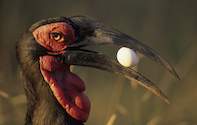
Ground Hornbill Population and Habitat Viability Workshop
"There is a very real possibility that South Africa may lose its Ground Hornbills within the near future if something radical is not done." This was one of the conclusions drawn at the Ground Hornbill Population and Habitat Viability Workshop held at the Southern African Wildlife College near Hoedspruit from February 7-11, 2005. onal Zoological Gardens.
Classified as Vulnerable due to its high risk of extinction in the wild in South Africa, there are thought to be fewer than 1500 Ground Hornbills left in the country. The workshop brought together 35 Ground Hornbill enthusiasts from all walks of life, including traditional healers, national and provincial parks' staff, forestry companies, academics and reintroduction specialists from the World Conservation Union (IUCN) as well as other conservationists.
Conservation Priorities
The group developed a prioritised action plan after identifying the major threats and conservation priorities for the charismatic bird and its natural habitat. The themes that will be focussed on in future conservation attempts are research into Ground Hornbill biology, their ecological needs, quantification, qualification and mitigation of their threats and education and awareness.
Ground Hornbill conservation will be spearheaded by the establishment and registration of a management plan for the species. The management plan will also cover the bird's natural habitat, the savannah ecosystem. This is in line with the new National Environmental Management Biodiversity Act.
The Endangered Wildlife Trust (EWT) Ground Hornbill Working Group also pointed out that the declining ground hornbill population could be a sign of another problem. "The savannah ecosystem has always been considered to be off the threatened list - but if Ground Hornbills are indicators of the status of this habitat, the savannah may require a lot more attention than previously thought."
Ground Hornbills are cooperative breeders that live in social groups where only the alpha male and female breed. It is estimated that a pair of Ground Hornbills fledge an average of one chick every nine years. This low productivity means that the steady decline in the species' numbers is unlike to undergo a turnabout under present conditions. In the last thirty years the birds have lost half of their natural range and declined in numbers by over 10 percent.
The workshop was sponsored by The Green Trust, Sasol, Johannesburg Zoological Gardens and the Nati.
By Melissa Wray, Klaserie

